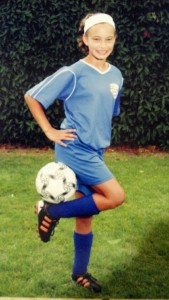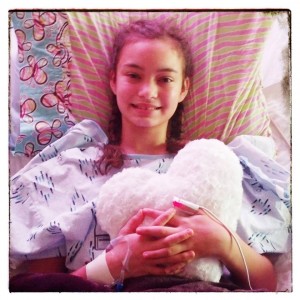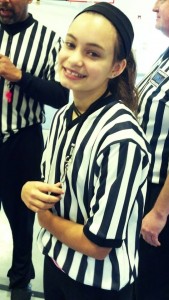
In honor of American Heart Month, we are sharing a series of stories about some of our incredible heart patients who have overcome the odds.
Nobi Johnson was a seemingly healthy, charismatic and extremely athletic 13-year-old girl. She excelled at sports and was a star on the basketball court and soccer field. There was nothing she couldn’t do if she put her mind to it, which made the diagnosis of an anomalous coronary artery difficult to understand. Sports were out of the question, due to the unforeseen heart defect. How would Nobi find her happiness again? It would take over a year, but Nobi would find herself back on the court, thanks to her determination to play again and Seattle Children’s and Mary Bridge Children’s Regional Cardiac Surgery Program.
“Her heart was pounding so hard and so fast”
In December 2012 Nobi was playing basketball, like most days, when she began to feel an unusual pounding in her chest. She didn’t think much of it, and neither did her mother, Sandy Johnson, who was also her assistant basketball coach.
The pain went away relatively quickly but, unfortunately, didn’t subside. It would sporadically return during practices and games. By February, her mother became more concerned.
“One day, at practice, Nobi was complaining about her chest pain,” said Sandy. “I felt her heart and my stomach knotted. Her heart was pounding so hard and so fast. It felt as if her heart would beat right out of her chest.”
Immediately, Sandy scheduled an appointment for Nobi to see a pediatrician. After some preliminary tests, Nobi was cleared to play sports, but as a precaution the pediatrician recommended Nobi see a heart specialist.
Nobi went on with her normal routine, basketball included. But the routine was short-lived. Nobi was seen by pediatric cardiologist Matthew Park, MD, with NorthWest Congenital Heart Care; an echocardiogram revealed she had a heart defect known as anomalous coronary artery (ACA). Nobi was then sent to Mary Bridge Children’s Hospital & Health Center in Tacoma for a CT scan, which further confirmed the diagnosis.
Typically, ACAs are present at birth, but aren’t diagnosed until adolescence or adulthood. Unfortunately, many teens or adults have no symptoms until an initial episode of chest pain, heart failure or sudden cardiac death occurs.
Nobi was told to stop playing sports immediately – no basketball, no soccer. Anything that would raise her heart rate was off limits.
“The diagnosis was an absolute kick in the gut,” said Sandy.
From all-star to sidelines
Not playing sports was really hard for Nobi and her family, but the uncertainty of her condition made the diagnosis worse. What was next?
“At first, they didn’t know if they’d need to operate on me or not,” said Nobi. “It was scary to think about.”
Controversy exists around the proper management of coronary artery anomalies. Although surgery is an option, many individuals choose alternative methods of treatment. Nobi and her family had to decide: never play sports again or have open heart surgery.
“We didn’t really know what to do. We wanted to verify that surgery was the best option. But we weren’t ready for surgery yet,” said Sandy.
Time to make a decision
In October 2013 the family met with Jonathan Chen, MD, pediatric cardiothoracic surgeon and co-director of the Heart Center at Seattle Children’s Hospital.
 Thanks to Seattle Children’s and Mary Bridge Children’s Regional Cardiac Surgery Program, Chen was able to advise Nobi and her family about their surgical options. Combining the regions leaders in pediatric cardiac surgery, Nobi was able to decide, with Chen, the best course of action for her, and her future.
Thanks to Seattle Children’s and Mary Bridge Children’s Regional Cardiac Surgery Program, Chen was able to advise Nobi and her family about their surgical options. Combining the regions leaders in pediatric cardiac surgery, Nobi was able to decide, with Chen, the best course of action for her, and her future.
“One option was to do nothing, and for Nobi to live a sedentary lifestyle. Another, in theory, was to go for unproven interventional procedures,” said Chen. “In the end, Nobi really drove the process of making a decision. She was determined to put this experience behind her and get back to sports.”
The family decided that day that Chen would be their surgeon. Nobi wanted to get back to the sports she loved.
“We instantly loved Dr. Chen. He made everything alright, and he made the idea of surgery less scary,” said Sandy. “He just had a different way of helping me through the process of deciding whether or not to put my cute little 13-year-old daughter through open heart surgery.”
On Dec. 16, 2013 Nobi was prepped for surgery, her family and friends there to cheer her on. Nobi wasn’t scared.
“We trusted Dr. Chen and knew surgery would be her best option,” said Sandy.
Getting back on the court
 Nobi had a community rallying behind her. With a smile strewn across her face, she was ready to be on the other side of surgery and back on the court. The surgery went very well, and Nobi was released from the hospital a mere three days later.
Nobi had a community rallying behind her. With a smile strewn across her face, she was ready to be on the other side of surgery and back on the court. The surgery went very well, and Nobi was released from the hospital a mere three days later.
“She was amazing in her recovery,” said Chen. “She’ll still need to see cardiologists, of course, but hopefully just for the annual check up on her progress. Her future is very bright.”
Today, Nobi is back on the basketball court, as an official. She isn’t able to play just yet, but she’s exceeding everyone’s expectations. And the entire family is using the experience as an opportunity to educate others.
Sandy’s main message to others: If a child complains of chest pain, dizziness or fainting during exercise, contact a doctor. Chest pain can be an early warning sign of heart failure.
“I didn’t take Nobi’s symptoms as serious as I should have,” said Sandy. “Coaches are the first line of defense. As soon as you see symptoms call your doctor. Nobi might not be here today if she had kept playing.”
Resources:
- Seattle Children’s Heart Center
- Regional Cardiac Surgery Program
- Healing hearts: How Children’s and a simple newborn screening test saved my son
- 5 tips for raising heart healthy kids
- Nick of Time Foundation
If you’d like to arrange an interview with the Heart Center please contact Seattle Children’s PR team at 206-987-4500 or [email protected].

